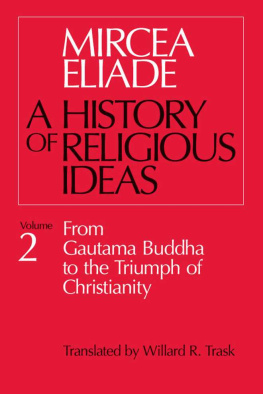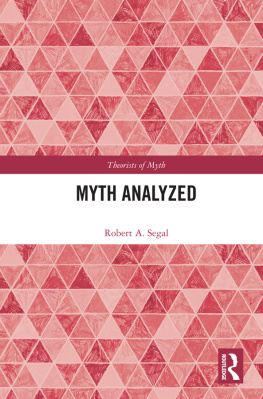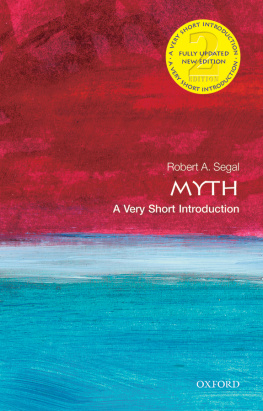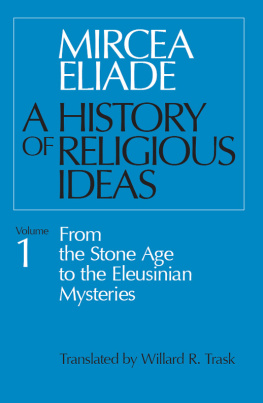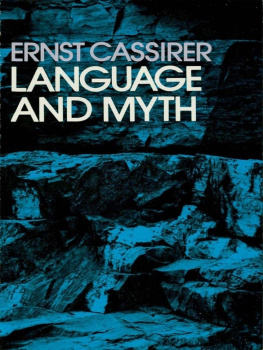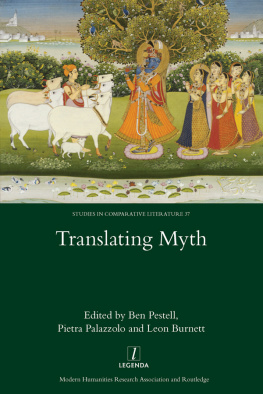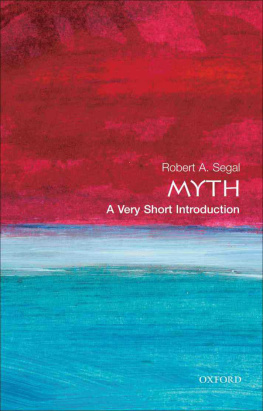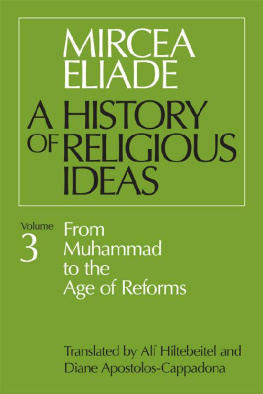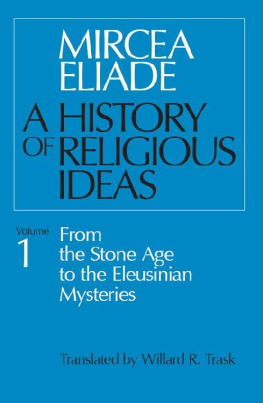MYTH AND RELIGION
IN MIRCEA ELIADE
Theorists of Myth
Robert A. Segal, Series Editor
Jung and the Jungians on Myth
An Introduction
by Steven F. Walker
Ren Girard and Myth
An Introduction
by Richard J. Golsan
Political Myth
A Theoretical Introduction
by Christopher G. Flood
The Poetics of Myth
by Eleazar M. Meletinsky
translated by Guy Lanoue and Alexandre Dadetsky
Northrop Frye on Myth
An Introduction
By Ford Russell
Cassirer and Langer on Myth
An Introduction
by William Schultz
The Myth and Ritual School:
J. G. Frazier and the Cambridge Ritualists
by Robert Ackerman
MYTH AND RELIGION IN MIRCEA ELIADE
DOUGLAS ALLEN
ROUTLEDGE
NEW YORK AND LONDON
Published in 2002 by
Routledge
29 West 35th Street
New York, NY 10001
Published in Great Britain by
Routledge
11 New Fetter Lane
London EC4P 4EE
Routledge is an imprint of the Taylor & Francis Group.
Copyright 1998 by Douglas Allen
Printed in the United States of America on acid-free paper.
All rights reserved. No part of this book may be reprinted or reproduced or utilized in any form or by any electronic, mechanical, or other means, now known or hereafter invented, including photocopying and recording or in any information storage or retrieval system, without permission in writing from the publishers.
10 9 8 7 6 5 4 3 2 1
Cataloging-in-Publication Data is available from the Library of Congress.
ISBN 0-415-93939-9
Contents
Series Editor's Foreword
Theories of myth are always theories of something larger such as literature, society, and the mind. To theorize about myth is to apply to the case of myth this larger theory. Theories of myth hail from an array of disciplines throughout the humanities and the social sciences. Of the theories that come from the field of religious studies, by far the most influential has been that of Mircea Eliade. Indeed, his is the only contemporary theory from religious studies that has had much influence outside of religious studies.
Douglas Allen is widely admired as the foremost authority on Eliade generally, and in his present book he brings to bear his mastery of Eliade's corpus and of the considerable scholarship on Eliade. Allen's position is atypical and almost unique among writers on Eliade: he is neither a devotee nor an antagonist but instead an expositor. He seeks neither to endorse nor to condemn Eliade's theory but, more fundamentally, to reconstruct it. He strives to work out the fundamental tenets that underlie Eliade's theory of myth, and by no coincidence those tenets also underlie Eliade's theory of religion. Allen is hardly unique in linking Eliade's theory of myth to Eliade's theory of religion, but he is unique in the rigor with which he unravels the philosophical roots of that theory of myth. Allen rallies to the defense of Eliade not when Eliade's philosophy is challenged but when Eliade's theory is dismissed as less than a well-conceived philosophy, when it is dismissed as the mere expression of Eliade's personal religiosity. Again and again, Allen spurns not those who disagree with Eliade but those who disagree without recognizing what Eliade is getting at, to use one of Allen's pet phrases. Allen himself by no means concurs in all of his subject's views.
Allen's previous books on Eliade present some of the same basic points of Eliade's philosophy as his present book, but only in Myth and Religion in Mircea Eliade does he hone in on the subject of myth. As much as Allen connects Eliade's theory of myth to Eliade's larger theory of religion, he also identifies the distinctively mythic element in religion for Eliade. As Allen says continually, all myth for Eliade is religious, but not all religion is mythic.
Allen shows that for Eliade myth is an indispensable element in achieving the kind of life that all humans crave. Eliade is therefore especially zealous to detect the scent of myth even among those who profess to be indifferent, if not hostile, to it. The presence of myth everywhere is taken as confirmation of its indispensability. While not all theorists of myth consider it a pre-modern, outdated phenomenon, Eliade is one of the most zealous to deem it a panhuman one. Among major theorists, only Joseph Campbell and perhaps C. G. Jung are as committed to the eternality of myth as he. At the same time the tie for Eliade between myth and religion remains: in claiming that even scrupulously rational, scientific moderns still cling to myths, Eliade is claiming that those same moderns also still cling to religiona link rejected by both Campbell and Jung. Ever sensitive to the nuances of Eliade's views, Allen maintains that Eliade is not thereby effacing the difference between primitives and moderns, as he is often charged with doing. But once again, Allen's concern is less to defend Eliade's position than to present it accurately. On this point, as on so many other points, Allen's book provides an unsurpassed overview of Eliade as theorist of at once myth and much else.
Robert A. Segal
Preface
Mircea Eliade, who was born in Bucharest in 1906 and died in Chicago in 1986, was often described by scholars and in the popular press as the world's most influential historian of religion and the world's foremost interpreter of symbol and myth. For example, an article in Time magazine identified Eliade as probably the world's foremost living interpreter of spiritual myths and symbolism, and an article in People Weekly claimed that Eliade is the world's foremost living historian of religions and myths.1 Not unusual was the claim by former Eliade student and leading historian of religions Lawrence Sullivan that Eliade has been the single most important individual in introducing the world to what religion means.2 An incredibly prolific writer, Eliade had what he described as a dual vocation as a scholar of religion and as a writer of literary works.3 Romanian was his literary language. His major scholarly works from Trait d'histoire des religions (English translation: Patterns of Comparative Religion) and Le my the de l'ternel retour (The Myth of the Eternal Return) in 1949 through the third volume of Histoire des croyances et des ides religeuses (A History of Religious Ideas) in 1983were written in French. He served as editor-in-chief of the sixteen-volume The Encyclopedia of Religion, published in 1987.
As influential as Eliade was as a scholar of myth and religion, he has remained extremely controversial. Indeed, many scholars, especially those in the social sciences, have completely ignored or vigorously attacked Eliade's scholarship on myth and religion as methodologically uncritical, subjective, and unscientific. Critics charge that Eliade is guilty of uncritical universal generalizations; reads all sorts of profound mythic and religious meaning into his data; ignores rigorous scholarly procedures of verification; and interjects all sorts of unjustified, personal, metaphysical, and ontological assumptions and judgments into his scholarship.
Both Eliade's style and the contents of his scholarly studies add to the controversial nature of his scholarship. He never seems as bothered as critics think any serious scholar should be by his eclectic approach, by contradictions and inconsistencies in his writings, or by his mixing of particular scholarly studies with sweeping controversial personal assertions and highly normative judgments. Unlike the self-imposed limited approaches of specialists studying myth and religion, he views his subject matter as the entire spiritual history of humankind. He often does many different things simultaneously, resists simple classification of his scholarship, and describes himself as an author



